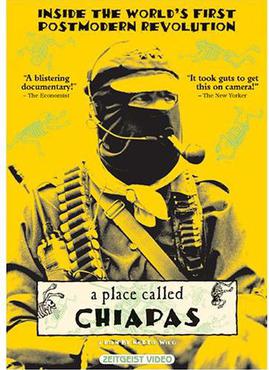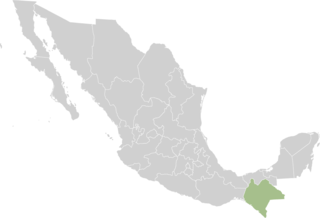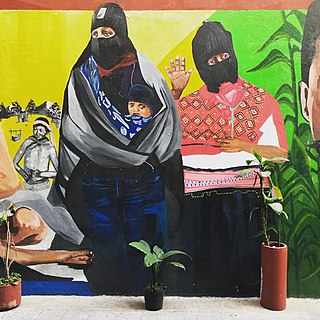Related Research Articles

The Zapatista Army of National Liberation, often referred to as the Zapatistas, is a far-left political and militant group that controls a substantial amount of territory in Chiapas, the southernmost state of Mexico.

Samuel Ruiz García was a Mexican Catholic prelate who served as bishop of the Diocese of San Cristóbal de las Casas, Chiapas, from 1959 until 1999. Ruiz is best known for his role as mediator during the conflict between the Zapatista Army of National Liberation (EZLN) and the Institutional Revolutionary Party (PRI), a Mexican political party which had held power for over seventy years, and whose policies were often disadvantageous to the indigenous populations of Chiapas. Inspired by Liberation Theology, which swept through the Catholic Church in Latin America after the 1960s, Ruiz's diocese helped some hundreds of thousands of indigenous Maya people in Chiapas who were among Mexico's poorest marginalized communities.

The Plan of Ayala was a document drafted by revolutionary leader Emiliano Zapata during the Mexican Revolution. In it, Zapata denounced President Francisco Madero for his perceived betrayal of the revolutionary ideals embodied in Madero's Plan de San Luis Potosí, and set out his vision of land reform. The Plan was first proclaimed on November 28, 1911 in the town of Ayala, Morelos, and was later amended on June 19, 1914. The Plan of Ayala was a key document during the revolution and influenced land reform in Mexico during the 1920s and 1930s. It was the fundamental text of the Zapatistas.
Subcomandante Elisa is a Mexican activist from Monterrey, Nuevo León. In the 1980s and early 90s, she served as a subcomandante in the Zapatista Army of National Liberation (EZLN). She was arrested in February 1995 in connection with the 1994 Zapatista uprising. In 1996, the Mexican government acknowledged it was a wrongful arrest and acquitted her of all charges. Today, she is a professor at the Autonomous University of Social Movements.

The Lacandon Jungle is an area of rainforest which stretches from Chiapas, Mexico, into Guatemala. The heart of this rainforest is located in the Montes Azules Biosphere Reserve in Chiapas near the border with Guatemala in the Montañas del Oriente region of the state. Although much of the jungle outside the reserve has been cleared, the Lacandon is still one of the largest montane rainforests in Mexico. It contains 1,500 tree species, 33% of all Mexican bird species, 25% of all Mexican animal species, 56% of all Mexican diurnal butterflies and 16% of all Mexico's fish species.

Comandanta Ramona was an officer of the Zapatista Army of National Liberation (EZLN), a revolutionary indigenous autonomist organization based in the southern Mexican state of Chiapas.

A Place Called Chiapas is a 1998 Canadian documentary film of first-hand accounts of the Ejército Zapatista de Liberación Nacional (EZLN) the and the lives of its soldiers and the people for whom they fight. Director Nettie Wild takes the viewer to rebel territory in the southeastern Mexican state of Chiapas, where the EZLN live and evade the Mexican Army.
The San Andrés Accords are agreements reached between the Zapatista Army of National Liberation and the Mexican government, at that time headed by President Ernesto Zedillo. The accords were signed on February 16, 1996, in San Andrés Larráinzar, Chiapas, and granted autonomy, recognition, and rights to the indigenous population of Mexico.

Neozapatismo or neozapatism is the political philosophy and practice devised and employed by the Zapatista Army of National Liberation, who have governed a number of communities in Chiapas, Mexico since the beginning of the Chiapas conflict. According to its adherents, it is not an ideology: "Zapatismo is not a new political ideology or a rehash of old ideologies. .. There are no universal recipes, lines, strategies, tactics, laws, rules or slogans. There is only a desire: to build a better world, that is, a new world."

John Ross was an American author, poet, freelance journalist, and activist who lived in Mexico and wrote extensively on its leftist political movements.

The Chiapas conflict comprised the 1994 Zapatista uprising, the 1995 Zapatista crisis and ensued tension between the Mexican state and the indigenous peoples and subsistence farmers of Chiapas from the 1990s to the 2010s.
On January 1, 1994, the Zapatista Army of National Liberation (EZLN) coordinated a 12-day Zapatista uprising in the state of Chiapas, Mexico in protest of the enactment of the North American Free Trade Agreement. The rebels occupied cities and towns in Chiapas, releasing prisoners and destroying land records. After battles with the Mexican Army and police, a ceasefire was brokered on January 12. Around 300 people were killed.

Subcomandante Marcos is the de facto spokesman for the Zapatista Army of National Liberation (EZLN), a Mexican rebel movement. He was also known as Delegado Cero during the EZLN's Other Campaign (2006–2007), and since May 2014 has gone by the name Subcomandante Galeano.

Rafael Sebastián Guillén Vicente is a Mexican insurgent, the former military leader and spokesman for the Zapatista Army of National Liberation (EZLN) in the ongoing Chiapas conflict, and an anti-capitalist and anti-neoliberal globalization icon. Widely known by his initial nom de guerreSubcomandante Insurgente Marcos, he has subsequently employed several other pseudonyms: he called himself Delegate Zero during the Other Campaign (2006–2007), and since May 2014 has gone by the name Subcomandante Insurgente Galeano, which he adopted in honor of his fallen comrade Jose Luis Solis Lopez, his nom de guerre being Galeano, aka "Teacher Galeano". Marcos bears the title and rank of Subcomandante, as opposed to Comandante, because, he is subordinate to, and under the command of, the indigenous commanders who constitute the EZLN's Clandestine Revolutionary Indigenous Committee's General Command.
Radio Insurgente is the official voice of the Zapatista Army of National Liberation (EZLN).The radio station has been operating since August 2003 and it is independent from the Mexican government. Its broadcasting location is unknown. Radio Insurgente's content is focused on promoting the ideas and struggles of the Zapatista movement. Radio Insugente transmits programs in Spanish and in the indigenous languages Tzotzil, Tzeltal, Chol and Tojolabal. According to their website, they transmit "from various places in Chiapas directed to the Zapatista bases, the insurgentes and milicians, the commanders and local people in general". No new programs have been posted on the website since 2009, but CDs are on sale on the site and users can listen to previous content.

Women have been influential in the Zapatista Army of National Liberation (EZLN) Ejército Zapatista de Liberación Nacional, a revolutionary leftist group in Chiapas, Mexico, by participating as armed insurgents and civil supporters. In the 1990s, one-third of the insurgents were women and half of the Zapatista support base was women. The EZLN organization style involved consensus and participation by everyone, including women and children. Therefore, one aspect of the EZLN's ideology was gender equality and rights for women. After the Zapatista uprising in Chiapas, the EZLN announced the Women's Revolutionary Law which was a set of ten laws that granted rights to women regarding marriage, children, work, health, education, political and military participation, and protected women from violence. Prominent figures who joined the movement early on such as Comandante Ramona and Major Ana Maria encouraged other women to join the Zapatistas.
The 1995 Zapatista Crisis refers to the aftermath of the 1994 Zapatista uprisings, which began as a result of the 1991 revision of Article 27 of Mexico's Constitution. This revision caused unrest in Chiapas's Southern Mexican state, as many indigenous tribes believed the article's revision negatively affected them due to the new economic policies. Violence ensued over several years, and the many peace deals proposed by the Mexican government were rejected. In the early days of the new government administration, President Ernesto Zedillo took a series of decisions that contradicted decisions from the earlier administration.

Rebel Zapatista Autonomous Municipalities are de facto autonomous territories controlled by the neo-Zapatista support bases in the Mexican state of Chiapas. They were founded following the Zapatista uprising which took place in 1994 and are part of the wider Chiapas conflict. Despite attempts at negotiation with the Mexican government which resulted in the San Andrés Accords in 1996, the region's autonomy remains unrecognized by that government.

Comandanta Esther is the nom de guerre of a revolutionary in the Zapatista Army of National Liberation (EZLN) of Chiapas, Mexico, created for indigenous people's rights. She is considered a high ranking woman in the EZLN. Military "commanders" have no actual military or governmental power and are simply spokespeople for the movement. Comandanta Esther is best known for her March 2001 speech to the Congress of the Union at the San Lazaro Legislative Palace in Mexico City, in which she spoke for constitutional recognition of indigenous people and the difficulty that indigenous women face in Mexico, demanded that their rights be acknowledged. Her work has helped inspire women activists to speak up in and join leadership roles in their communities in Mexico.
Major Ana María is the nom de guerre of one of the first military leaders who led the Zapatista uprising in San Cristóbal de las Casas, in the Southwest of Mexico.
References
- 1 2 Mattiace, Shannan L. (2003). To see with two eyes: peasant activism & Indian autonomy in Chiapas, Mexico . University of New Mexico Press. p. 126. ISBN 978-0-8263-2315-6.
- ↑ Henck, Nick (2007). Subcommander Marcos: The Man and the Mask . Duke University Press. p. xxiii. ISBN 978-0-8223-3995-3.
- ↑ Stacy, Lee (2002). Mexico and the United States. Marshall Cavendish. p. 385. ISBN 978-0-7614-7402-9.
- ↑ Arnson, Cynthia (1999). Comparative peace processes in Latin America. Stanford University Press. p. 305. ISBN 978-0-8047-3589-6.